With just two weeks before the release of Black Widow, it feels like a long time coming for audiences to finally see the origin story of our one and only, Natasha Romanoff. Of course for comic book fans, Nat’s origin and the story of her becoming a Black Widow of the Red Room is old hat at this point. But other than a glimpse in Avengers: Age of Ultron, we haven’t really gotten a close look at Nat’s origin story.
And much of that is to the fault of Marvel, who have really placed Nat in as a supporting character since the beginning of the MCU. Recently Scarlett Johansson, who has played Natasha for over a decade, came out about her character being hypersexualized on screen and being treated like a possession in her debut appearance in Iron Man 2 in an interview for HelloBeautiful. While there is a lot to be said about Marvel dragging their feet on giving Nat her own movie, the film itself touches on far more than just Nat’s physical appearance and her relationship with her fellow male Avengers. Thank god.
In a press conference with the cast, director Cate Shortland, and producer Kevin Feige, we were able to dig deep into the complex story of Black Widow.
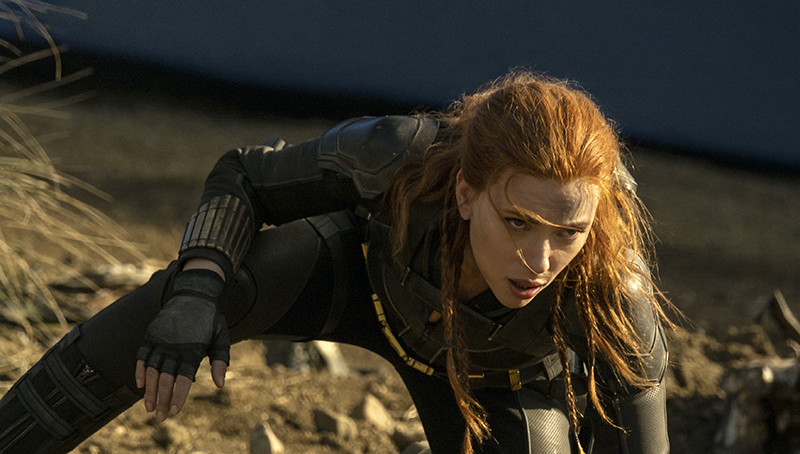
The Elephant in the Room
Anyone who has seen Endgame (and if you haven’t what are you doing with your life?) will know that Natasha Romanoff, as we know her, is no longer a member of the land of the living. She sacrificed her life so that Clint Barton/Hawkeye could get the Soul Stone, and that was the last we saw of her. However, for Scarlett Johansson, filming Endgame and Infinity War also coincided with talks about Black Widow.
“We started talking about this film as a more serious possibility when we were doing, I think, Infinity War. We shot Infinity War and then Endgame back-to-back. So, we already knew what the Endgame was for Natasha. But we wanted to make sure that was a choice that she made actively. That it felt like she has resolve then. So knowing that, we then had to kind of work backwards so that she could get to a place where that was possible,” Johansson said.
“We knew that in this film she had to evolve into a place where she was moving forward in her life and had resolved the trauma from her past. […] That she felt like a different person moving forward if that makes any sense. It was a very weird way of working,” she added. “It was interesting to be working on something presently that also played into what you would be doing in the future that was reflective of the past. It was crazy.”
Kevin Feige, who is not only the producer of this film but also known to be the president of Marvel Studios and the chief creative officer of Marvel Entertainment, said, “We very specifically knew there was a large period of her life that we didn’t know about. Not just her childhood, but this period of time between Civil War and Infinity War. And that period, we felt was ripe to creatively focus on, to be able to discover more about her past and more about her present.” He then added that the film would also give a hint at the legacy for the future.
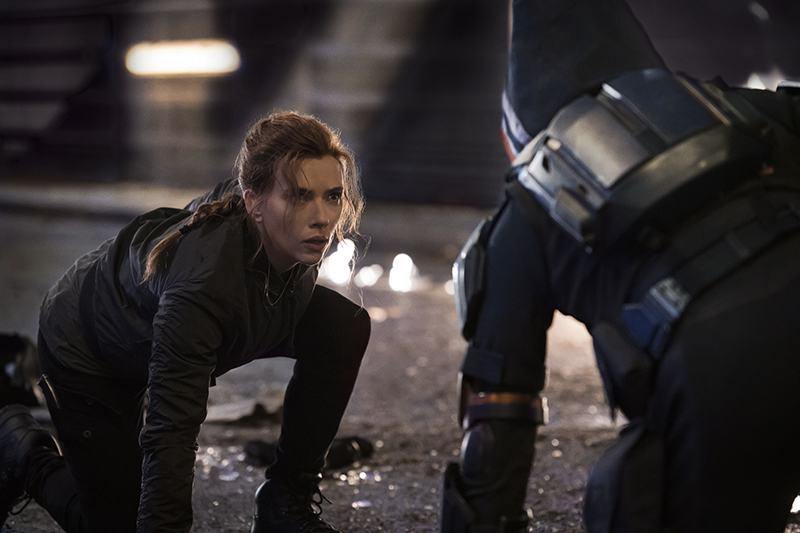
A New Nat
Throughout the years and through the rise of the MCU, Scarlett Johansson’s Natasha Romanov has been a sort of constant and has become a fan favorite. “Scarlett Johansson is an amazing performer and with each and every appearance you learned more, you saw more, and you wanted to know more. The fact that we finally have an entire feature dedicated to that was very exciting for all of us,” said Feige.
“From the beginning when we spoke about the film,” director Cate Shortland explained, “We knew that it had to speak to two things, which was Natasha as an individual and then what had happened to her and who she was at the beginning of the film, which was [when] she was completely alone.” And this new loneliness is new, both for Natasha as a character and also for us as audience members.
“She’s always been a part of something,” Johansson said, pointing to her time in the Red Room as a Widow, then joining SHIELD, before becoming an Avenger. “She’s always been a part of something that was part of a greater whole. And then suddenly she finds herself sort of floating in this weird in-between space and she’s off her game. She realizes that she’s got all this possibility in front of her and it’s really suffocating. Then she’s blindsided by this person who comes from her past, who is just on fire and is a liability and [has] got this crazy energy and is dangerous, and is full of life, and isn’t needy, but needs her. She’s so thrown off her game in this. It’s great to see her like that. We never get to see her like that. That was a fun place to start from. She’s just full of doubt.” That person from her past is Yelena Belova, played by Florence Pugh, who acts like a sister-figure to Natasha.
Johansson also added, “[Natasha] has a lot of integrity. She is a big character. And she’s not afraid to admit when she’s wrong. She’s endearing that way. She’s curious about herself and curious about other people. I think it makes her stand out.” This characteristic has been one of Natasha’s quiet defining traits. Her willingness to learn, her curiosity, her adaptability. It’s what makes her such a powerful character and also what ranks her beside super soldiers and gods.
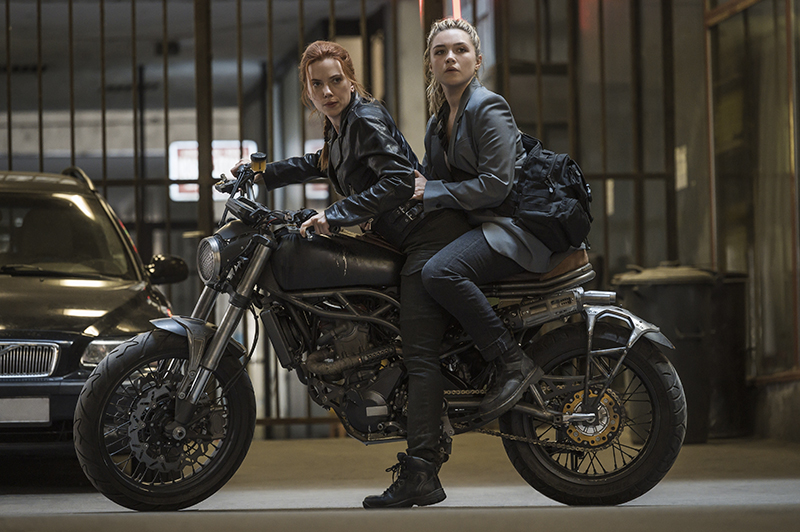
Setting the Tone for Black Widow
Like many of the other MCU films, Black Widow dances between being serious and taking on a serious story while also injecting their own brand of quippy humor. It feels synonymous with the Marvel brand to have gut-wrenching moments that have us emotionally compromised over fictional characters while also doubling down on incredibly repeatable one-liner zingers. Although you might not expect much humor when it comes to a subject like the Red Room, the basic premise of which is trafficking young girls to turn them into sterile, killing machines, Black Widow tries to strike a balance. “I thought it should be like a fairground ride, so really exhilarating. […] [It] was always about putting Natasha at the center of [the movie], but making sure that we didn’t let the trauma of her past drag it down, rather that we came up to answer it, and we often did that with humor,” said Shortland.
But balancing that humor is the very real and bleak origin of the Red Room, which we get glimpses into at various points of the movie. One of those points is the opening credits, where we see a young Natasha and Yelena. “We needed to set the stage for what both of these women, all of these women, and characters had gone through in their past and exactly what Ray Winstone, the villain of our piece, had done. And what made him so, so evil in his dealings,” Feige explained about the opening credits.
The scenes are a collage of events on how Black Widows are created and how insidious the process truly is. Watching it back a second time after seeing the whole movie can add even more layers of complexity to it. It is all set to the eerie tune of Think Up Anger’s cover of Nirvana’s “Smells Like Teen Spirit,” a song I’ve been obsessed with for a while and one I need to be on Spotify. Maybe now it might finally happen because of this movie. “It was tremendous,” Feige said, “and ended up being one of our rare pre-opening title sequences that really helped set the tone and the backstory for Natasha’s character.”
Of course, when it comes to Black Widow, you have to have fight sequences. But Shortland explained that the fight sequences all had their own purpose rather than focusing on specific character fighting styles. “Different fights had different hats to them,” she said. “When I talked about the film, with the choreography, [it] was about creating… it was watching humans fight, not superheroes. And then they’d have to really scramble. And Kevin spoke about [how] he always wanted it to have stakes. So it wasn’t like the fights could just be perfectly choreographed. There had to be little moments of accidents and mess-ups and things that you weren’t expecting, and that was really fun.”
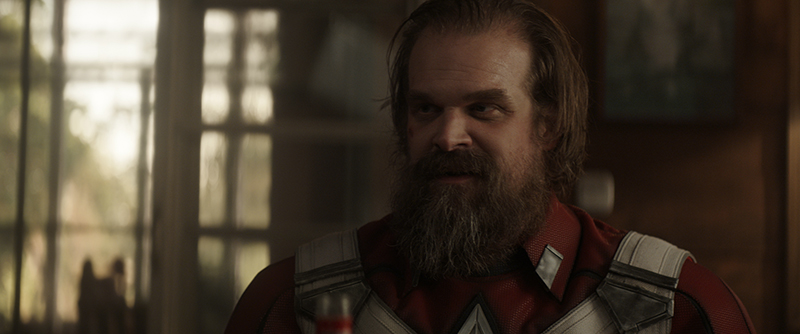
Red Guardian vs. Captain America
A surprising gem of Black Widow comes in the form of David Harbour’s Alexei Shostakov aka Red Guardian. He is the Soviet super-soldier counterpart to Captain America, though he is hardly the figure that Steve Rogers was. Although Alexei sees himself as a contemporary of Cap’s, his road is far less heroic. Other than his stint as a father to Yelena and Natasha, we can only infer about the adventures of Red Guardian.
“What’s funny about Alexei is you have this big 25-year gap that we don’t know about. Right? Like, we see him in Ohio and then we see him in the prison,” Harbour explained. “And even before the prison, there was a time when he was the Red Guardian. He wants to put the suit back on. So there is this period of time where he talks about… he has all these stories about his life and about what went on. And there are questionable… whether or not they’re real.”
“I like the [exploration] of what is real and what isn’t real, and how hard he had to construct these realities for himself and how durable those realities are. But you know, I do think that the classic Cold War thing is a really fun and funny dynamic between these two guys, and the fact that they basically came up as nuclear warheads, like in an arms race together, I think it’s just a really great concept that could be explored further.”
Those keeping up with the Disney+ shows know that we have a new Captain America now in the form of Anthony Mackie’s Sam Wilson. When asked about potential Red Guardian team-ups, Harbour mentioned Mackie’s Cap as a potential candidate. “I really love the Falcon character. I love Anthony Mackie just as an actor too. And now that he’s wearing the Cap suit and everything and the amount of complexity that Alexei has with Cap, in general, whoever wears the suit. Like, he hates that guy, and he hates who he represents,” Harbour laughed, and went on to say, “Some of the funniest stuff to me [in the film] is where he’s like, ‘You know, he actually was a colleague of mine. I mean, you know, we had a lot of respect for each other.’ I just think that dynamic would be really fun to see.”
Does the Red Guardian deserve his own little Disney+ show? I definitely wouldn’t be opposed to it.
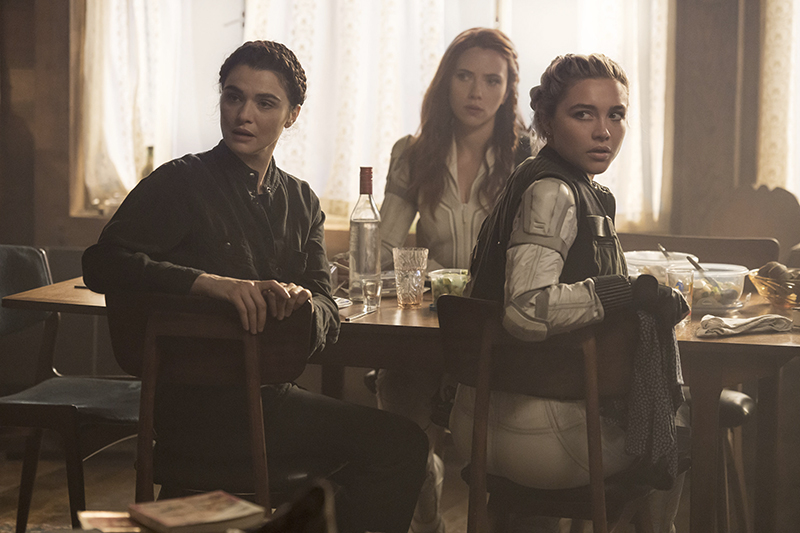
Black Widow: Family Matters
The big heart of Black Widow is the bond between Natasha and Yelena Belova, her sister-figure. Beyond Yelena, Natasha also has bonds with her mother-figure, Melina, played by Rachel Weisz, and her father-figure, Alexei. The entire family is not only dysfunctional because of their ties to the Red Room but incredibly estranged after many years apart. Weisz complimented the complexity of the characters, saying, “People are just many, many, many things. And what the writers got onto the page and what Cate directed was just highly complex people that are very contradictory. Yeah, we’re, all three of us, elite Black Widows, but there’s a lot more to them than just that.”
“I like stories about people, but it was wonderful to tell a story with three complicated, strong women. On the page, I thought she was a really unusual character,” said Weisz about her character Melina Vostokoff, another Black Widow and one of the Red Room’s head scientists. When the group is reunited as a family, Weisz described those scenes as “incredibly intimate and incredibly emotional.”
One of these emotional scenes was shared between Johansson and Florence Pugh, whose first scenes together were also the first scenes the two actors ever shot together. The two are thrown into a fight in Budapest in the middle of a heatwave. Both Johansson and Pugh describe it as a bonding moment for the two of them.
“It’s such an emotional fight,” Johansson explains. “It’s all driven by emotion. There’s no real end goal there; it’s just two people expressing their frustration and also the power struggle and their genuine surprise and affection for one another. You know, it’s like to lion cubs just going at it.”
“These two sisters that haven’t seen each other in years, and they don’t know how to be around each other,” Pugh adds.
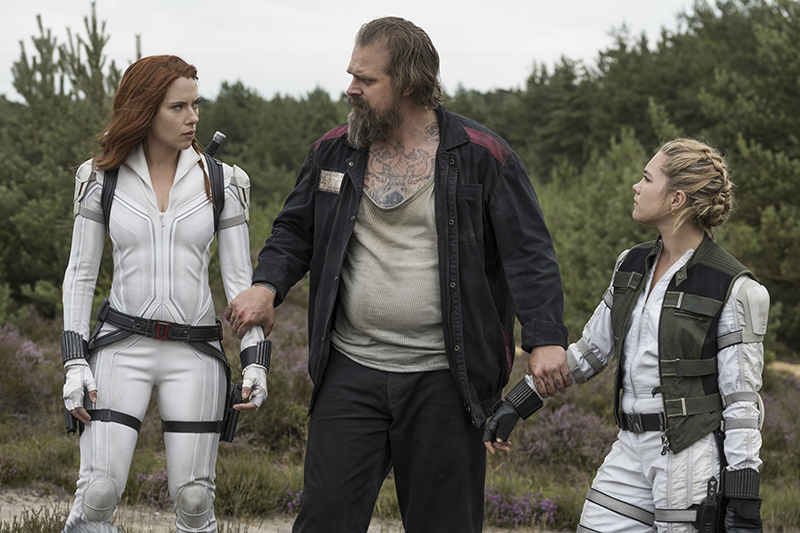
And, although the family is not related by blood, they are still bonded together by their past and their experiences. “From the get-go, in the script, it was very obvious that they have this connection and they have this relationship,” said Pugh. “And ultimately despite her skillset, she is that wonderfully annoying younger sister that says all the right things at all the wrong times.”
“That wasn’t hard at all for me to get into. I think something that I really appreciated was Cate was so welcoming of me, to figure out how she thinks and how she moves and what she wears. I think, for me, that was such a fun part of figuring out this character.” Pugh goes on to explain that being able to slowly create and discover Yelena and find the “oddities” of her character helped her with the character. Through this process, by the end of the film, Yelena is able to flourish on her own.
Harbour who plays the gregarious super-soldier Red Guardian added a punch of humor into his scenes as Nat and Yelena’s father-figure. “He is filled with grief and remorse about the choices that he’s made like, emotionally, spiritually, nutritionally. Right?” Harbour joked. “But the comedy itself comes out of the ego that is built to defend against the feelings of that remorse. So in other words, he has to be [so] bombastic because he can’t stop and feel these things, you know, the failures that he made. So, he has to build around him a confabulatory, psychotic reality where he the hero. And that’s inherently silly. I mean, that’s inherently funny.”
In one of the big scenes where we see Nat, Yelena, Milena, and Alexei reunited together at the dinner table, Harbour pointed out the parallels that can be seen between the family and a traditional nuclear family. “[It] is the perfect image for this movie. [All] of us around a table in these very specific positions, which I remember talking about that day that we shot it. But we’re all in super suits. Right? But you have this almost Norman Rockwell thing of like dad coming in last to sit at the head of the table while eldest child sits here and mother and baby sit over here. I found us all sort of falling into these traditional cliché roles. And then riffing off of that.”
While Natasha’s story is still over in some ways, that doesn’t mean that we’ve seen the last of the Black Widow. And, indeed, after the presumed success of Black Widow, it seems likely that we might be able to jump around a bit more in the timelines of our beloved characters. When asked about potential prequel-styled films for other characters, Feige said, “The notion of exploring the past, present, and future of the MCU is certainly in the cards for all of our characters.” And, I think, we’re a-okay with that.
Black Widow debuts in theatres and on Disney+ with Premier Access starting July 9th!
* The quotes from this interview have been edited for clarity.